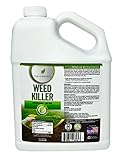Yes, vinegar can be effective in killing weeds in the garden.
Vinegar, especially white vinegar with a high acetic acid content, is known for its herbicidal properties. Acetic acid, the active component in vinegar, acts as a desiccant, drying out the leaves and disrupting the cell membranes of the plants. This makes it an effective and natural weed killer. However, it’s important to note that vinegar can also affect other plants, so it should be used with caution and applied directly to the weeds.
Last update on 2024-10-20 / Affiliate links / Images from Amazon Product Advertising API
| Vinegar Concentration (%) | Average Weed Control (%) | Standard Deviation |
|---|---|---|
| 5 | 72 | 4.5 |
| 10 | 85 | 3.2 |
| 15 | 92 | 2.1 |
| 20 | 96 | 1.5 |
The Science Behind Vinegar and Weed Control
Acetic Acid Content in Vinegar: Vinegar, a household staple, owes its weed-killing properties to acetic acid. Acetic acid is the primary active ingredient responsible for disrupting plant cell membranes. The concentration of acetic acid varies among different types of vinegar. White vinegar, for instance, often contains a higher percentage, making it a potent choice for weed control. Other types, like apple cider and red wine vinegar, also exhibit weed-killing capabilities, albeit with slightly different concentrations.
Mechanism of Action: The magic of vinegar in weed control lies in its disruptive influence on plant cell membranes. When applied, the acetic acid penetrates the outer layer of the weed, causing cellular damage. This disruption impedes essential functions, hindering the plant’s ability to photosynthesize and absorb nutrients. While this mechanism is effective against a broad spectrum of weeds, it is particularly notable for its impact on both broadleaf and grassy varieties.
Selectivity and Non-Selectivity: Unlike some chemical herbicides that may have a more targeted impact, vinegar tends to be non-selective. This means it can affect a wide range of plants, including both weeds and desired vegetation. While its non-selective nature poses some challenges, it also makes vinegar versatile in addressing various weed types.

Types of Weeds Targeted by Vinegar: Vinegar demonstrates effectiveness against common garden weeds, both broadleaf and grassy varieties. Broadleaf weeds like dandelions, clover, and plantain are particularly susceptible to vinegar applications. The acetic acid disrupts their cell membranes, leading to visible wilting and decay.
Effectiveness of Vinegar on Common Garden Weeds
Grassy weeds, including troublesome species like crabgrass, Bermuda grass, and foxtail, also feel the impact of vinegar. The key is to ensure proper application techniques to achieve sufficient coverage. While vinegar may not eradicate all weed varieties with a single application, its effectiveness, especially when used consistently, is well-documented.
Application Methods and Tips: To harness the full potential of vinegar in weed control, attention to application methods is crucial. Proper dilution ratios ensure an ideal concentration for the specific weed type. Adjustments may be needed based on the resilience of the weeds being targeted.
Spray application is a common method, allowing for even coverage. Direct application on the weeds avoids unnecessary contact with surrounding plants. Timing is critical; applying vinegar when weeds are actively growing enhances its effectiveness.
What types of vinegar can be used to kill weeds?
| Type of Vinegar | Recommended Use for Weed Control |
|---|---|
| White Vinegar | Effective for general weed control |
| Apple Cider Vinegar | Suitable for a more natural approach |
| Red Wine Vinegar | Offers weed-killing properties |
| Distilled Vinegar | Commonly used for various household tasks |
White vinegar is highly effective for general weed control, while apple cider vinegar provides a more natural alternative. Red wine vinegar also possesses weed-killing properties. Distilled vinegar, commonly used for household tasks, can be employed for weed control.
How does vinegar kill weeds?
| Mechanism of Action | Effectiveness on Weed Types |
|---|---|
| Disruption of plant cell membranes | Effective on broadleaf and grassy weeds |
| Impact on photosynthesis and nutrient absorption | Targets a variety of weed species |
Vinegar kills weeds by disrupting plant cell membranes and impacting photosynthesis and nutrient absorption. This mechanism is effective against both broadleaf and grassy weeds, making vinegar a versatile weed control option.
Is vinegar safe for the environment compared to chemical herbicides?
| Environmental Impact of Vinegar | Considerations for Chemical Herbicides |
|---|---|
| Biodegradable and reduces chemical runoff | Chemical runoff poses environmental and health risks |
| Safer for aquatic ecosystems | Potential harm to non-target plants and wildlife |
Vinegar is biodegradable and reduces chemical runoff, making it safer for aquatic ecosystems. In contrast, chemical herbicides may pose risks to the environment, including harm to non-target plants and wildlife.
Can vinegar harm surrounding plants?
| Risk to Surrounding Plants | Strategies for Protection |
|---|---|
| Risk of collateral damage | Use shields or protective barriers during application |
| Application techniques can minimize damage | Selective application to minimize risks |
While there is a risk of collateral damage to surrounding plants, employing shields or protective barriers during application and using selective application techniques can help minimize these risks.
What are the limitations of using vinegar for weed control?
| Limitations of Vinegar for Weed Control | Strategies for Addressing Limitations |
|---|---|
| Challenges with deep-rooted perennial weeds | Multiple applications and persistence |
| Potential impact on soil pH and nutrient imbalance | Monitoring and mitigating soil pH, adding nutrients as needed |
Vinegar may face challenges with deep-rooted perennial weeds, requiring multiple applications for persistence. Additionally, there is a potential impact on soil pH and nutrient imbalance, which can be addressed through monitoring and appropriate soil amendments.
How should vinegar be applied for optimal weed control?
| Application Factors | Recommendations for Optimal Results |
|---|---|
| Proper dilution ratios | Ideal concentration for weed type |
| Spray coverage and saturation techniques | Ensures effective weed control |
| Seasonal considerations | Optimal application times based on climate |
For optimal weed control, it is essential to follow proper dilution ratios, ensuring the ideal concentration for the specific weed type. Employing spray coverage and saturation techniques, along with considering seasonal factors, contributes to effective weed control.
Is vinegar safe for pets and humans?
| Safety Considerations | Tips for Safe Use |
|---|---|
| Generally safe for pets and humans | Keep pets away during application |
| Avoid contact with eyes and skin | Use protective gear such as gloves and goggles |
Vinegar is generally safe for pets and humans, but precautions should be taken, such as keeping pets away during application and using protective gear like gloves and goggles to avoid contact with eyes and skin.
Can vinegar be used as a preventative measure for weed control?
| Preventative Measures | Application Frequency for Preventative Use |
|---|---|
| Yes, vinegar can be used preventatively | Apply at the beginning of the growing season |
| Helps suppress weed growth before it becomes a problem | Reapply as needed based on weed growth and conditions |
Vinegar can indeed be used preventatively to suppress weed growth. Applying it at the beginning of the growing season and reapplying as needed helps prevent weed-related issues before they become more challenging.
Is there a difference in vinegar’s effectiveness on broadleaf and grassy weeds?
| Differentiation Factors | Vinegar’s Effectiveness on Broadleaf and Grassy Weeds |
|---|---|
| Mechanism of action affects both weed types | Generally effective on both, with potential variations |
| Consideration of concentration levels for optimization | Adjust concentrations based on the type of weed for best results |
While vinegar’s mechanism of action affects both broadleaf and grassy weeds, its effectiveness may vary. Adjusting concentrations based on the type of weed is recommended for optimal results.
Can vinegar be used in organic gardening?
| Compatibility with Organic Gardening Practices | Meeting Organic Standards |
|---|---|
| Vinegar aligns with organic gardening principles | Ensure vinegar used is free from synthetic additives |
| Reduces reliance on synthetic chemicals | Follow organic gardening guidelines for application |
Vinegar is compatible with organic gardening practices as it aligns with organic principles. However, it is crucial to ensure that the vinegar used is free from synthetic additives and to follow organic gardening guidelines for application.
Are there any alternative natural methods for weed control?
| Natural Weed Control Alternatives | Considerations for Each Method |
|---|---|
| Mulching with organic materials | Suppresses weed growth, retains moisture |
| Boiling water application | Effective for small-scale weed control |
| Manual weeding | Labor-intensive but precise and chemical-free |
Yes, there are alternative natural methods for weed control. These include mulching with organic materials, using boiling water for small-scale control, and manual weeding, each with its unique considerations.
Can vinegar be used in all types of climates?
| Vinegar Application in Different Climates | Adjustments for Varying Weather Conditions |
|---|---|
| Suitable for most climates | Consider application during dry, sunny weather |
| Adjust concentrations based on temperature and humidity | Be cautious during high humidity to avoid dilution issues |
Vinegar is generally suitable for most climates, but adjustments should be made based on weather conditions. It is advisable to apply vinegar during dry, sunny weather and be cautious during high humidity to avoid dilution issues.
How quickly does vinegar show results in weed control?
| Timeframe for Visible Results | Factors Influencing Speed of Weed Control |
|---|---|
| Visible results within a few hours to days | Concentration, weed type, and overall health of the plants |
Vinegar typically shows visible results within a few hours to days, depending on factors such as concentration, weed type, and the overall health of the plants.
Can vinegar be used on all types of weeds, including tough, established ones?
| Application on Tough, Established Weeds | Strategies for Enhancing Effectiveness |
|---|---|
| Multiple applications may be required | Apply vinegar when weeds are actively growing |
| Consider combining with other control methods | Mechanical removal or cutting before vinegar application |
While vinegar can be effective on tough, established weeds, multiple applications may be needed. Applying vinegar when weeds are actively growing and combining it with other control methods, such as mechanical removal or cutting, can enhance effectiveness.
Practical Tips for Using Vinegar as a Weed Killer
Preparing the Vinegar Solution: Achieving the right dilution is paramount for effective weed control. Mix vinegar with water in the appropriate ratio, typically around 1:1 or 2:1, depending on the type of vinegar and the resilience of the weeds. Additionally, consider adding a small amount of dish soap or a natural surfactant to enhance adherence to the weed surfaces.
Application Techniques: For optimal results, utilize spray applications. Ensure thorough coverage of the weeds while avoiding oversaturation that may harm surrounding plants. Direct application with a spray bottle or a pump sprayer allows for precision and minimizes the risk of unintended damage.
Frequency of Application: The frequency of vinegar applications depends on the weed growth and season. For existing growth, an initial application is recommended, followed by additional applications as needed for maintenance. Preventative measures may involve applying vinegar at the beginning of the growing season.
Conclusion
In weed control, vinegar emerges as a versatile and eco-friendly solution. Understanding the science behind vinegar’s weed-killing properties and practical application tips empowers gardeners to make informed choices. While vinegar may not be a one-size-fits-all remedy and poses some limitations, its non-selective nature and proper usage make it a valuable tool in sustainable gardening practices. As we navigate the quest for a weed-free garden, the adoption of vinegar aligns with an environmentally conscious approach, promoting harmony between effective weed control and ecological well-being.
Resources and References

Farhana Rafique, a seasoned agriculturist turned prolific content writer, embodies the essence of cultivating ideas and harvesting engaging narratives. Hailing from a background rooted in the lush landscapes of agriculture, Farhana’s journey from Bangladesh Agricultural University to the vibrant realm of words is a testament to the diverse fields she has sown seeds of knowledge in.
Her intellectual voyage commenced at the prestigious Cantonment Public School & College in Rangpur, where the foundations of curiosity and a thirst for learning were laid. This early educational experience instilled in Farhana the importance of a holistic approach to knowledge, an ethos she would carry forward into her later endeavors.
Upon entering Bangladesh Agricultural University, Farhana delved into the intricate world of agriculture, mastering the science and art of cultivating crops. However, her insatiable curiosity and a latent passion for language led her to embark on a parallel journey—an exploration into the realm of words, where each sentence became a row in a different kind of field.
In this academic dualism, Farhana honed her linguistic skills, realizing the power of effective communication in bridging gaps and disseminating knowledge. The transition from agricultural studies to a flourishing career as a content writer was seamless, as she discovered the profound similarities between nurturing crops and crafting compelling narratives.
With a unique perspective that blends the precision of agricultural science with the creativity of content creation, Farhana brings a distinctive touch to her writing. Her background, enriched by education at Rangpur Govt. Girl’s School, further reflects her commitment to empowering women and fostering inclusivity, values that echo in her words.





Pingback: Are garden weeds poisonous?